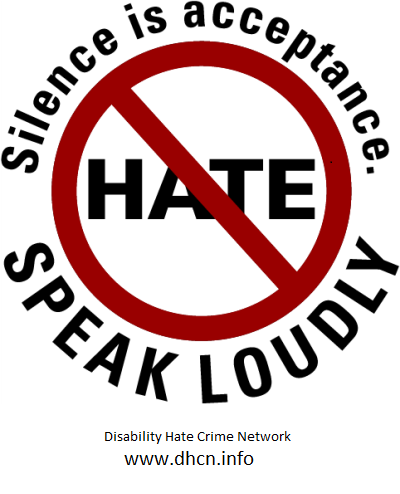In National Hate Crime week 2017, we still need to realise that there is a lasting impact of DHC.
Historically it is recalled that there have been a number of high profile cases of disability hate crime, such as Brent Martin, Steven Hoskin both with a learning disability, and the deaths of Fiona Pilkington and her daughter Frankie in Leicestershire, as well as David Askew in Greater Manchester. But those, dare we say, fortunately are not too frequent, and a recent survey we did at the Hate Crime Network revealed that more than half of disabled people in say they have experienced repeat ‘low level’ hostility, aggression or violence because of their condition or impairment, all too often from complete strangers.
For a long time we have been saying that police responses need to be more consistent. The numbers of reports of hate crimes against disabled people seem to be growing although such crimes often go uncharged. The depth of impact created by hate crime have far-reaching implications beyond the victims, and strikes at social cohesion and citizenship. Family members of disabled hate crime victims, who may not be disabled themselves, are often similarly victimised. And disabled people who have never experienced hate crime often change or modify their lives to avoid putting themselves at risk.
We are very concerned that while some police forces are committed to tackling these crimes information and learning is very patchy. Our contacts who are often victims say that Hate crime against disabled people needs to be given more priority and more clarity.
Continual research shows hostility against disabled people has an impact that extend way beyond the physical and emotional harm experienced by the victims. Statutory bodies and local authorities need to recognise that Hate crimes damages communities and members feel a sense of shame and anger. There is thus an urgent need for disability hate crime to become a greater priority, both at the national and local level. More specifically, police services across the UK should look critically at the way in which they tackle hate crime against disabled people.
We appreciate that police services face a number of challenges (and costs) in tackling disability hate crime but we found infrequent replication in the structures of different police services and many don’t have dedicated hate crime officers in place. It is problematic that all too often hate crime incidents and issues are tackled by a variety of personnel, such as Community Liaison Officers, Diversity Officers and Police Community Support Officers, who frequently work to different standards and drivers.
Surely there is a need to ensure joined-up work with understandable and transferable lines of reporting and accountability. Everyone from all areas including the 3rd sector agree that the level of reported disability hate crime is much lower than it should be and does not reflect the actual number of incidents, and this is sometimes due to disabled people not bothering to report incidents. This does prevent police services from making properly informed decisions about effective resourcing. All police services felt that low prevalence figures were a result of under-reporting although it is encouraging that the best police services are now recording hate incidents as well as hate crimes.
In the work in the North West we know that face to face input by disabled people at officer training meant that their officers became better at identifying and recording hate crime. Such work includes an element of interacting with and getting to know police officers and others who are involved in tackling these issues.
The best outcomes happen when police services work with local partners to support individuals that want to report incidents at places they visit often or make it easier for them to access pleases other than the police station. Almost all hate crime policies include guidance on investigating hate crime in general but there do not appear to be any disability-specific investigation and evidencing procedures in place.
Sadly some groups such as those with a learning disability feel significant dissatisfaction with the way they have been handled by the police. Police officers were often felt to be ‘patronising’ or ‘rude’ and did not know how to communicate with victims with a learning disability in an appropriate manner.
Costs play a part here and we know that police services we consulted with reported that police officers had only received general equality and diversity training with little specific focus on learning disability. This needs to be rectified in many force areas.
In conclusion we feel that the tackling of hate crime could be vastly improved if police services got together to share their learning and coordinate their practices. We are determined that tackling disability hate crime will still be an important and appropriately resourced priority for police services across the UK.
Stephen Brookes MBE.


